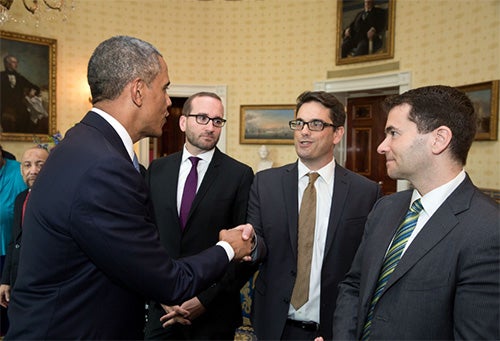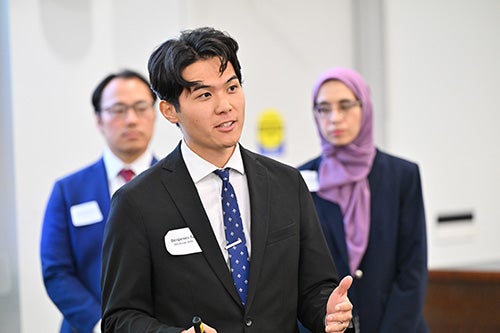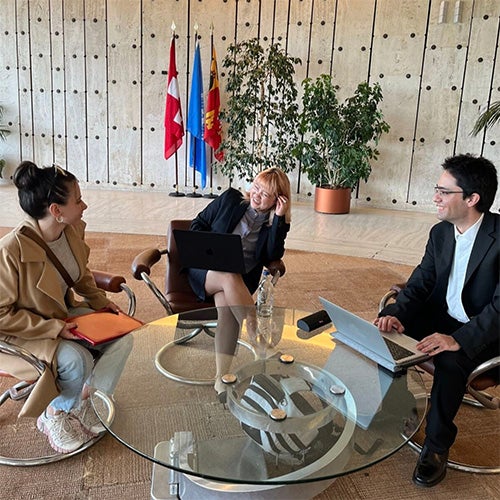Instituting Impact
UCLA Law Magazine | Summer 2025 | Volume 47
A look inside UCLA Law’s robust centers of scholarship and advocacy, which have expanded the law school’s influence on the most important issues of the day.

In 2001, same-sex marriage was not legally recognized, workplace protections for LGBTQ employees were virtually nonexistent, and 14 states and the U.S. military still criminalized same-sex sexual activity. In that year, UCLA Law launched the Williams Institute, a think tank dedicated to rigorous research on sexual orientation and gender identity law and policy.
“It was really a courageous thing for the law school to do,” said founding executive director Brad Sears, who has seen the institute grow from a startup to an essential source for several of the Supreme Court’s most important decisions on LGBTQ rights. “There was no other law school at that time that had a specific program focused on LGBTQ people, and there were actually very few programs in academia.”
In fact, the Williams Institute was the first academic center of its kind anywhere in the world. So, too, was UCLA Law’s Critical Race Studies (CRS) program, a global driver in the civil rights legal space since its 2000 founding.
“The fact that we’re among the youngest major law schools in the country means that we have the freedom to build new ways of training lawyers.”
As those programs reach their quarter-century, at a moment that happens to fall around the law school’s 75th year, their influence on UCLA Law’s identity is clear. The launches of CRS and the Williams Institute— and, a few years later, the Emmett Institute on Climate Change and the Environment — marked inflection points for UCLA Law. The school had been creating world-class lawyers for decades, but the turn of the 21st century brought about a bold shift in thinking about what else a leading law school should offer.
Thanks to the immense contributions of alumni donors and other philanthropic partners in the com- munity, more centers of scholarship emerged before long, all of them building on the model of engagement and scholarship that CRS, Williams, and Emmett had established. Now numbering more than two dozen, the centers encompass a panoply of disciplines. Each was established with a mission to drive change through academic rigor, specialized training, and issue advocacy— and each made an immediate impact while boosting the school’s reputation and galvanizing its intellectual core.
Today, these centers are at the heart of the UCLA Law experience, amplifying the research of faculty members and top experts in an array of fields, informing policymakers in the United States and around the world, and offering students unparalleled experiential educational opportunities. The collective scope of these projects underscores a scholarly dynamism that has existed at UCLA Law since day one, along with a nimbleness that has allowed the school to enhance
its founding mission of public service by repeatedly adapting to a changing world.
“The fact that we’re among the youngest major law schools in the country means that we have the freedom to build new ways of training lawyers, learning lessons from what has come before,” said Cara Horowitz ’01, executive director of the Emmett Institute.
A legacy of leadership

At a time when environmental regulations are under threat, Emmett Institute students work to protect vulnerable communities from pollution. Meanwhile, researchers are delving into the legal underpinnings of energy policy, geoengineering, and environmental governance in China, to name a few initiatives.
“California has been at the forefront of environmental protection and climate change innovation forever,” Horowitz said. “This makes the institute an important place to think creatively about what communities should be doing to advance environmental protections. There are opportunities to push the envelope in California that I don’t think exist elsewhere.”
This perspective carries throughout UCLA Law's programs, centers, and institutes.
The Lowell Milken Institute for Business Law and Policy, the longtime home of UCLA Law’s nationally renowned business and tax law faculty, regularly hosts summits where practicing lawyers come together to share insights on key matters in business law. It also sponsors the annual Lowell Milken Institute–Sandler Prize for New Entrepreneurs competition, providing a significant boost to students with actionable business plans. Meanwhile, the newer Lowell Milken Center for Philanthropy and Nonprofits delves into the study of one of the most pertinent emerging areas, as baby boomers retire and “the Great Wealth Transfer” continues.
Milken ’73 said that his motivation was “to provide students with a broad range of opportunities beyond just their academic training. I also wanted to provide the faculty with opportunities for greater visibility for their research and work, and to engage the broader community— both legal and nonlegal— in issues where UCLA Law could play a leadership role.”
The Ziffren Institute for Media, Entertainment, Technology and Sports Law is another key hub where scholars and practitioners work with students and outside partners to foster a new generation of lawyers adept at contending with contemporary matters.

This includes work in emerging technology; name, image, and likeness issues in sports; and patents. The institute also helps produce the annual UCLA
Entertainment Symposium, the preeminent summit of entertainment lawyers, now in its 49th year.
Ken Ziffren ’65 founded the institute, which built on the law school’s existing programming and expansive reputation as the nation’s No. 1 school for entertainment law. “The whole idea of it appealed to me,” he said. “The law school, I think, is famous, or notable, for its programs. And my interest was in both giving back and at the same time giving students the opportunity to come into the media and entertainment sector better prepared than if the institute didn’t exist.”
Philanthropic visions have driven other centers to immense success.
The Promise Institute for Human Rights was inaugurated to boost UCLA Law’s changemaking scholarship on an array of issues, from migrant rights to accountability for violations to environmental harms. The Promise Institute Europe, meanwhile, places students on the front lines of global policymaking through semesters spent working and learning in The Hague.

The Resnick Center for Food Law and Policy is a pioneer in global scholarship and advocacy. It partners with the United Nations and other important organizations to create guidelines on food governance. It produces a podcast featuring interviews with leading food law experts. And it takes on issues that are not often addressed in law schools, allowing students to play a leading role in its cutting-edge movement toward improved health and sustainability.
The Center for Immigration Law and Policy has led advocacy for migrants, DACA recipients, and other people involved in the American immigration system, and it has notably ramped up efforts as regulations change seemingly by the day and uncertainty abounds.
The Native Nations Law and Policy Center makes a meaningful mark as a place that promotes ground- breaking scholarship, enables community-driven projects, and builds a pipeline for the most promising advocates and academics in the Indian law space. A significant amount of the center’s work happens on the ground through the Tribal Legal Development Clinic, which engages in quality-of-life and other justice issues.
And the David J. Epstein Program in Public Interest Law and Policy is the home of UCLA Law’s legendary and fundamental work in public interest law. Each year, the program turns out graduates who continue to wage many of the most important fights for fair- ness— the kind of legal work that has characterized the law school since 1949.
As Horowitz said, “California is a state where the politics still allow for innovative solutions to tough problems. This means that our students can work on real-world solutions to tough problems in our own backyard. It’s incredibly motivating and rewarding to see our work make a difference in the world.”
Promoting progress
For most of its first quarter-century, CRS has stood as a signature endeavor of UCLA Law. It was founded in 2000, four years after California voters passed Proposition 209 to prohibit state governmental institutions from considering race, sex, or ethnicity in public education. “Prior to that, UCLA was one of the most diverse law schools in the country, but diversity dropped dramatically as lots of students of color didn’t want to apply, thinking it was not a welcoming environment,” said Jasleen Kohli, the program’s executive director.
CRS was the first effort at any law school to incorporate critical race theory into legal scholarship and teaching. From the start, it has been the home of many of the nation’s leading scholars in critical race theory. The program’s singular mission: to train new generations of legal advocates and scholars who are committed to racial justice. Students who specialize in CRS move on to jobs in local, state, and federal government, as well as public interest work in areas such as environmental justice, workers’ rights, and housing.
“As the years have gone by, our reputation has really grown,” said Kohli, who added that a third of 1L students come to UCLA Law intending to pursue a CRS specialization. “I’ve had students tell me that this is the only law school they applied to because of the Critical Race Studies program. We’ve attracted so many faculty and students who are invested in racial justice and in understanding how to use the law to create real, transformative change.”
Their success serves as a symbol of the impact that the law school’s programs, centers, and institutes create: While the challenges are complex, UCLA Law is now, more than ever, a wellspring of solutions.
UCLA Law is grateful to funders who support our institutes, centers, and programs.
Read more in the 75th Anniversary edition of the UCLA Law magazine.
Celebrating 75 Years of UCLA Law
Join the dean of UCLA School of Law, Michael Waterstone, UCLA Chancellor Julio Frenk, and distinguished faculty, students, and alumni as we celebrate 75 years of UCLA Law. This video tribute honors our history of legal innovation and vision for shaping tomorrow's legal landscape. From groundbreaking scholarship to producing leaders who have transformed the practice of law, UCLA Law continues its tradition of excellence while looking boldly toward the future.